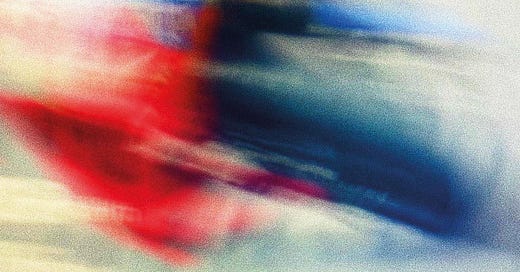
I recently came across the work of Thibaut Grevet, a very successful French director and photographer. Last year, he published his first solo book with the title “BLURRED”, a compilation of images featuring indistinct and blurred subjects.
Ignant, an award-winning online magazine, did a profile on him and had this to say:
“A deliberate and intentional choice, the blur adds a sense of energy, motion, and spontaneity to the images, as if the viewer is experiencing the world as it unfolds in real time. At once bold and subtle, evocative and understated, the photographs create a feeling of mystery, inviting introspection and contemplation. A refreshing departure from the overly crisp, highly polished images that dominate Instagram and advertising, Blurred invites viewers to slow down and look closer, allowing their imaginations to fill in the gaps.”
Deliberate and intentional.
Experiencing the world as it unfolds in real time.
A feeling of mystery, inviting introspection.
Allowing imagination to fill in the gaps.
What if — counterintuitive as it may be — deliberately blurring our vision could actually help us see better?
What if our ever crisper, ultra high resolution, ultra high definition, precision and personalization obsessed culture actually makes us miss the larger picture?
What if instead …
Blurring could help us see that our incessant focus on screens is disconnecting us from ourselves, the people and the world around us? Is it possible that the clarity we seek in digital pixels is actually fragmenting our holistic view of life?
Blurring could help us see that our single-minded obsession with short term financial results is impoverishing our exploration of finding better ways to create value? Could we consider the possibility that the relentless pursuit of immediate gains blinds us to sustainable, long-term innovations?
Blurring could help us see that our compulsive pursuit of productivity is getting in the way of tapping the infinite creative potential of our imagination? Might we reflect more on how the drive for efficiency often stifles our ability to pause and unlock our creativity?
What if deliberate blurring could give our minds the time and space needed to refocus and imagine a better way?
By changing the way we see, we might create the right conditions for imagination to flourish, helping us cultivate a mindset that embraces the unknown and finds clarity in ambiguity.
What would ‘blurring’ let you see in your day-to-day life?
What will you refocus and imagine once you’ve seen it?
###




Ich denke eher an die Fähigkeit, je nach Problem oder Aufgabe, zwischen der Mikro- und der Makroebene zu unterscheiden und im Idealfall beide Ebenen in einer Entscheidungsfindung zu berücksichtigen. Wie wenn ich mich an einem Mikroskop in verschiedene Vergrößerungen vortaste und was anfangs unscharf ist, dann scharf stelle. Erst wenn ich sowohl die Details als auch das Große Ganze einer Herausforderung verstehe, komme ich zu einer ausgewogenen Lösung, die möglichst allen Stakeholdern gerecht wird.
This i very much akin to thoughts I've had recently. About leading with the heart instead of with the mind.
When we are open and in flow with the world we don't narrow our focus to problems we need to solve and/or overcome.
When we trust our abilities and peripheral view there's no need to be deliberate or goal oriented. We emanate openess and welcome the same from the world and other people.